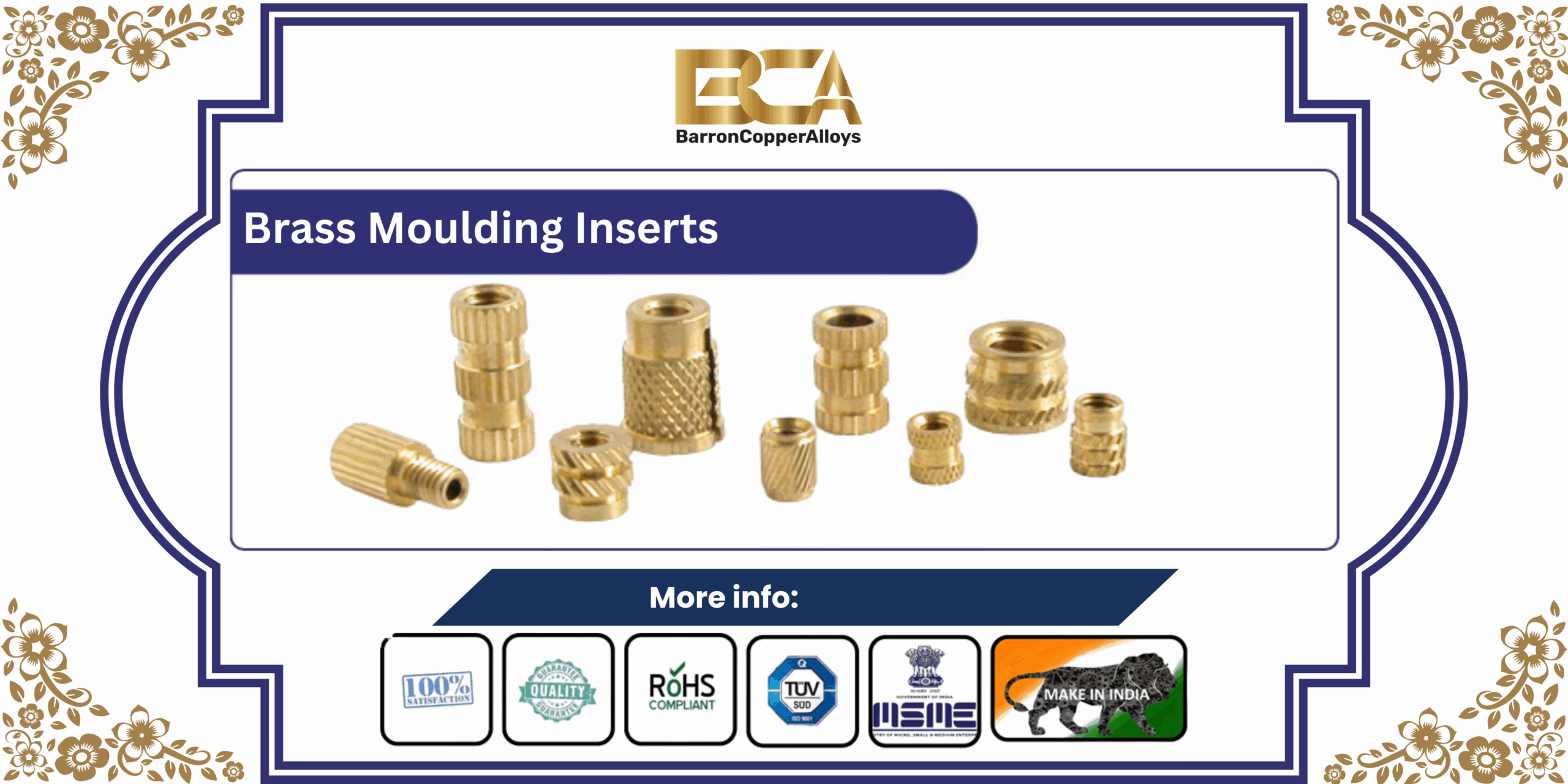Brass Moulding Inserts
- Home
- Brass Moulding Inserts

🏗️What They Are Brass Moulding Inserts
Brass Moulding Inserts are precision-engineered threaded components designed to be installed into thermoplastics and thermoset materials to provide strong, wear-resistant internal threads.
They are suitable for mould-in, heat-set, ultrasonic, and press-fit installation methods. These inserts deliver high pull-out and torque resistance, ensuring secure fastening in plastic components across automotive, electrical, electronics, and industrial assemblies.
-
Brass moulding inserts are small metal components (usually made of brass) that are moulded into or inserted post-moulding into plastic, wood, or other soft substrates.
-
Their main job is to provide strong, durable threaded holes in materials that would otherwise be too weak or soft to hold a screw reliably.
⚙️ Brass Moulding Inserts Material
-
Typically made from free-cutting brass (for example, IS 319 Type I, or BS 249 Type I) for ease of machining and good mechanical properties.
-
More advanced or custom grades may also be used (depending on customer spec) — to provide better strength, corrosion resistance, or thermal behavior.
🔩Threads (Internal) & External / Outer Design Features
-
They support a wide variety of internal thread standards, such as: ISO Metric, UNC, UNF, BSW, BA, BSP, etc., depending on the manufacturer.
-
Their internal thread dimensions are typically maintained to very tight tolerances (“Go & Not Go” standards) to ensure fit and reliability.
-
Knurling: The outer surface often has a knurled pattern (such as diamond knurl, straight knurl, or unidirectional knurl) to improve grip with the material into which the insert is embedded.
-
Grooves: Some inserts have deep grooves to maximise pull-out resistance (i.e., resistance against being pulled out when a screw is used).
-
Shapes: Available in multiple outer shapes — round, hexagonal, square — depending on use-case and required orientation/grip.
🔩Installation Method / Types
Depending on how / when they’re placed, there are different types:
-
Mould-in inserts: These are placed inside the mold core before plastic injection, so that once plastic is injected, the insert becomes an integral part of the plastic component.
-
Press-in inserts: Inserted into pre-moulded / drilled holes using a press. Useful for softer plastics.
-
Ultrasonic inserts: Installed using ultrasonic vibration + heat to melt the plastic slightly and insert the brass part, so it bonds in.
-
Heat-set inserts: The insert is heated (e.g. with a soldering iron) and pressed into a pre-formed hole in the plastic. As the brass cools, the plastic solidifies around it, creating a strong joint.
🔩Mechanical / Functional Properties
-
Pull-Out Strength: Designed to resist being extracted when screws are screwed in / out, thanks to knurling and groove design.
-
Torque Resistance: Good resistance to torque — the knurling and close tolerances help prevent the insert from rotating in the plastic.
-
Thermal Stability: Brass handles high temperatures well, making these inserts suitable for robust industrial applications.
-
Corrosion Resistance: Brass naturally resists corrosion, and further coatings (nickel, tin, etc.) are commonly offered.
-
brass moulding inserts
-
brass mould in inserts
-
brass injection moulding inserts
-
brass heat set inserts
-
brass ultrasonic inserts
-
brass threaded inserts for plastic
-
brass knurled inserts
-
moulding inserts manufacturer
-
brass inserts supplier
-
brass components for plastics
-
mould-in threaded inserts
-
custom brass moulding inserts
🧱 Size / Dimension Range
-
Thread sizes can start very small (e.g. M2) and go up to larger sizes (depends on manufacturer) — custom sizes are often possible.
-
Lengths / heights vary depending on design; manufacturers often offer custom lengths.
-
There are datasheets available (for example, from JC Fasteners) which show detailed dimensions for different thread sizes + insert length.
🧱 Finish / Coating
-
Insert finishes vary: Natural Brass, Nickel-plated, Tin-plated, and other custom coating options as per client requirement.
-
These surface treatments help with corrosion resistance, aesthetics, and sometimes better bonding with the moulded material.
Material Specifications
| Parameter | Specification |
|---|---|
| Base Material | Free Cutting Brass IS 319 Type I / BS 249 Type I / ASTM C360 |
| Optional Material | High-grade brass, Lead-free brass, Dezincification-resistant brass (DZR) |
| Finish / Coating | Natural Brass, Nickel Plated, Tin Plated, Chrome Plated |
| Thread Standard | ISO Metric (M2–M12), UNC/UNF (2-56 to ½”), BSW, BA, BSP |
Dimensional Specification
| Thread Size | Outer Diameter (OD) | Length (L) | Internal Thread | Knurl Type | Installation |
|---|---|---|---|---|---|
| M2 | 3.5 mm | 4–6 mm | M2 x 0.40 | Diamond / Straight | Heat-Set / Ultrasonic |
| M3 | 4.6–5.0 mm | 4–10 mm | M3 x 0.50 | Diamond / Helical | Mould-In / Heat-Set |
| M4 | 6.0–6.5 mm | 6–12 mm | M4 x 0.70 | Straight | Mould-In |
| M5 | 7.2–8.0 mm | 8–15 mm | M5 x 0.80 | Diamond | Mould-In / Press |
| M6 | 9.0–10.0 mm | 10–18 mm | M6 x 1.0 | Helical / Grooved | Heavy Duty Mould-In |
Mechanical Properties
| Property | Typical Value* |
|---|---|
| Tensile Strength | 350–450 MPa |
| Shear Strength | 200–280 MPa |
| Hardness | 75–90 HB |
| Thermal Conductivity | ~110 W/m-K |
| Melting Point | ~920°C |
| *Values depend on brass grade and insert geometry. |
More Information:
Sample Time:Available in 5-10 days for different items.
Drawing Format:CAD / PDF / DWG / IGS / STEP.
Packaging:Standard package, Carton box or Pallet, As per customized specifications
Shipping:DHL, FEDEX, UPS and By Sea or as per client’s requirements.

